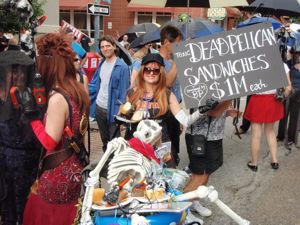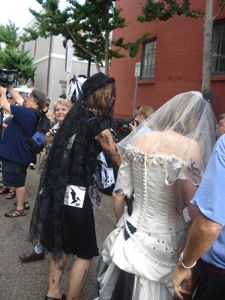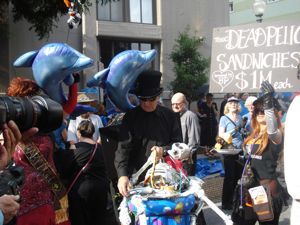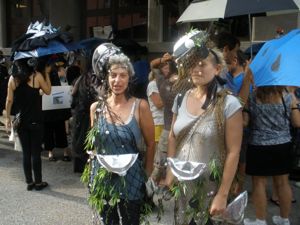NOLA Residents Take to the Streets
Air Date: Week of June 11, 2010

(Photo: T.J. Fisher)
Residents of New Orleans are feeling a mix of emotions as the Gulf oil spill continues to spew from the ocean floor. For many, there are echoes of the anxiety, helplessness, and frustration experienced five years in the aftermath of Hurricane Katrina. During the past week or two, some of those feelings have been channeled to public displays of anger. But as Julia Botero reports, the people of the region have a complicated relationship with the oil industry, and their views on the spill are not just black and white.
Transcript
YOUNG: It’s Living on Earth, I’m Jeff Young. During the past week or two, protests have flared up around New Orleans. These are some of the first organized displays of public anger since oil started washing up on the Louisiana coast. A lot of people in the Big Easy are clearly uneasy with their state’s oil industry.
But beyond the chants of demonstrators, far more nuanced conversations are taking place. Louisiana has a complicated relationship with the oil, gas and offshore industries. As reporter Julia Botero found, views on the spill are far from black and white.
[SFX]
BOTERO: It’s a sweltering Saturday in downtown New Orleans and a couple of hundred or so people are spilling onto the streets, dressed in costumes. It’s not Mardi Gras, and these costumes aren’t particularly festive either. The organizers of this event stress this is a funeral procession, not a parade.

(Photo: Julia Botero)
MULLEN: I am the bad bride of big oil… My costume involves a hacked up wedding gown decorated with seashells and oil. The underskirt is black silk; there are oily black feathers on it, layers of tulle and fake pearls from Mardi Gras.
BOTERO: Laura Mullen is part of The Krewe of Dead Pelicans, the group protesting against the Gulf oil spill. She’s lived in New Orleans for years and said she’s here in grief and anger.
MULLEN: From the minute this started happening it was clear this was going to get this bad and we were going to have to look at animals dying and communities dying and I'm here to say no to that and we have rethink our energy policy, otherwise this is the wedding we are going to have.
BOTERO: Louisiana has already been married to the oil industry for decades. Residents of the state have watched as grids of canals forged by the oil companies through the Mississippi Delta have caused damage to the wetlands. Still, oil is big business down here. Jack Benson is wearing a shirt that reads, “BP lied, Pelicans Died.”
BENSON: We have lived in harmony with the oil business for a very long time. Where the anger comes from is just the blatant disregard. We understand the risk of the oil business- at the same time we would except a much better response from them and that is where the anger stems from.
[SFX} Group of protestors say: Stop big oil, save the Gulf.

(Photo: Julia Botero)
BOTERO: The organizer of the days’ action, retired realtor, Ro Mayer, says most people weren’t sure how to direct their anger. She was overcome with emotion as she watched accounts of the spill.
MAYER: Blind, roaring, rage-driven adrenaline that arced from my toes out the top of my head. I had the same feelings for Katrina, the first time I had ever had those kinds of feelings...
BOTERO: Mayer vented some of those feelings on Facebook, and her page became an outlet for rants against BP from more then 5,000 people. She began planning the procession to call attention to this anger. Yet she admits she has mixed feelings about the oil industry.
MAYER: I grew up here, I’ve got family for generations that have been in the oil business...We kind of have that family legacy that I never thought too much about it, until we started dealing with this mess.

(Photo: T.J. Fisher)
THOMAS: The oil industry is a major part of the culture in Louisiana, just as the commercial fisheries is, just as all the things that we provide to our nation are a major, major element of the culture of this area and the evolution of this culture.
BOTERO: Professor Robert Thomas is the chair of environmental communications at Loyola University. He says when oil and gas exploration first began 100 years ago it brought prosperity to Louisiana and the country. Now, the people of Louisiana and the oil industry go hand in hand.
THOMAS: We as Louisianans, define ourselves on the basis of the culture that we have. And if you take away the elements of this culture, such as the work ethics, and the national resources that we value, and our food and components of our way of life, you destroy the culture and we will no longer exist as a people that we have in the past.
[SFX] Audience clapping. Speaker says: “I want to give you a briefing on the oil spill….”

(Photo: Brenda Edwards Wold)
BOTERO: In a church in the Upper Ninth Ward, Kerry St. Pe gives a teach-in to an audience of about 90 locals. He’s a biologist who’s overseen oil spills in the region and knows the effects oil can have on the wetlands.
[SFX] St. Pe talks to audience….
BOTERO: Like many in the community, Danielle Butsche has been feeling anxious since she the spill began. She sees the disaster as yet another threat to the livelihood of the people of New Orleans and Louisiana.
BUTSCHE: It just felt like this last year we really went over the hump, it just feels like we just got off our knees and now we are being knocked back down.
BOTERO: Another resident, Eve Abrams, sees the oil spill as a wake-up call on what she could do to help her home state. She wants to encourage people to buy Louisiana seafood and pay attention to who they're electing to office.
ABRAMS: You know the oil companies didn’t just move in here on their own. We elected the government officials who paved the way for them. So that’s something that we as citizens can do, I think it’s really easy to feel powerless as one person, but united, I mean, that’s the intent of a democracy.
BOTERO: Nearly five years after Hurricane Katrina, New Orleans and Louisiana are once again living within a critical moment. And no one knows better then its residents that the effects of the oil spill could redefine their culture and way of life for decades to come. For Living on Earth, I'm Julia Botero.
[MUSIC] NOLA REAX: Trombone Shorty “Hurricane Season” from Backatown (Verve records 2010).
Links
Krewe of Dead Pelicans Facebook page
Professor Robert Thomas, Environmental Communications, Loyola University
Kerry St. Pe, Director, Barataria-Terrebonne National Estuary Program
Living on Earth wants to hear from you!
Living on Earth
62 Calef Highway, Suite 212
Lee, NH 03861
Telephone: 617-287-4121
E-mail: comments@loe.org
Newsletter [Click here]
Donate to Living on Earth!
Living on Earth is an independent media program and relies entirely on contributions from listeners and institutions supporting public service. Please donate now to preserve an independent environmental voice.
NewsletterLiving on Earth offers a weekly delivery of the show's rundown to your mailbox. Sign up for our newsletter today!
 Sailors For The Sea: Be the change you want to sea.
Sailors For The Sea: Be the change you want to sea.
 The Grantham Foundation for the Protection of the Environment: Committed to protecting and improving the health of the global environment.
The Grantham Foundation for the Protection of the Environment: Committed to protecting and improving the health of the global environment.
 Contribute to Living on Earth and receive, as our gift to you, an archival print of one of Mark Seth Lender's extraordinary wildlife photographs. Follow the link to see Mark's current collection of photographs.
Contribute to Living on Earth and receive, as our gift to you, an archival print of one of Mark Seth Lender's extraordinary wildlife photographs. Follow the link to see Mark's current collection of photographs.
 Buy a signed copy of Mark Seth Lender's book Smeagull the Seagull & support Living on Earth
Buy a signed copy of Mark Seth Lender's book Smeagull the Seagull & support Living on Earth

